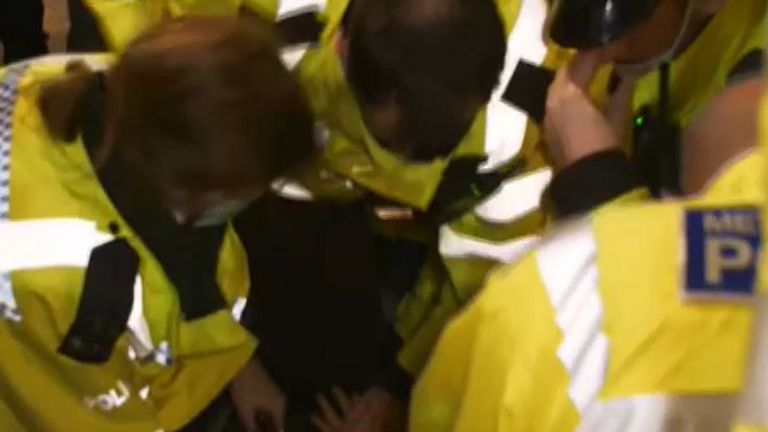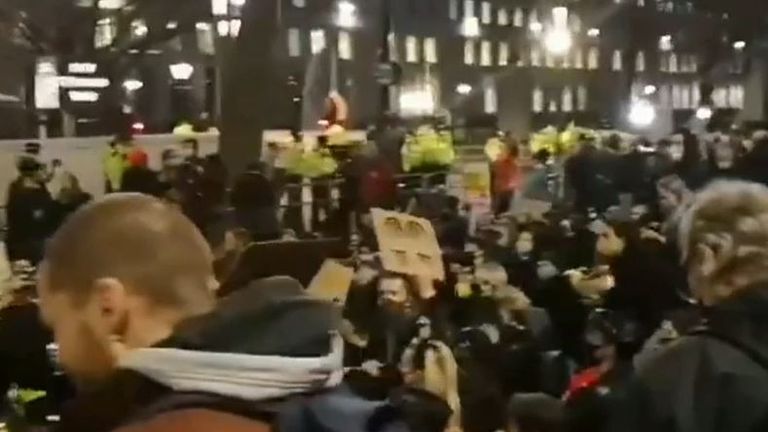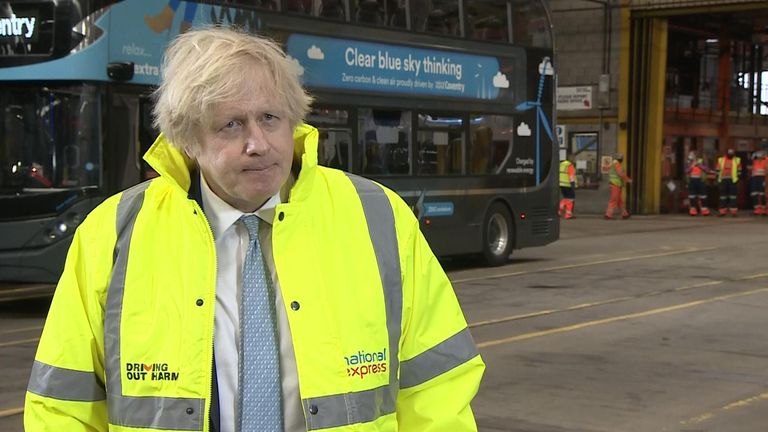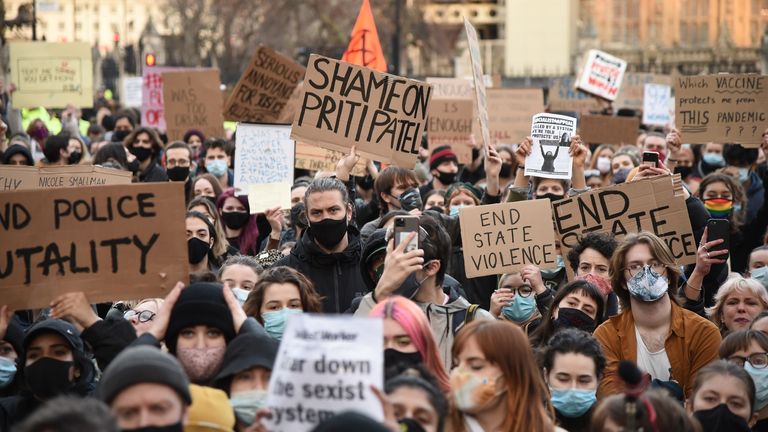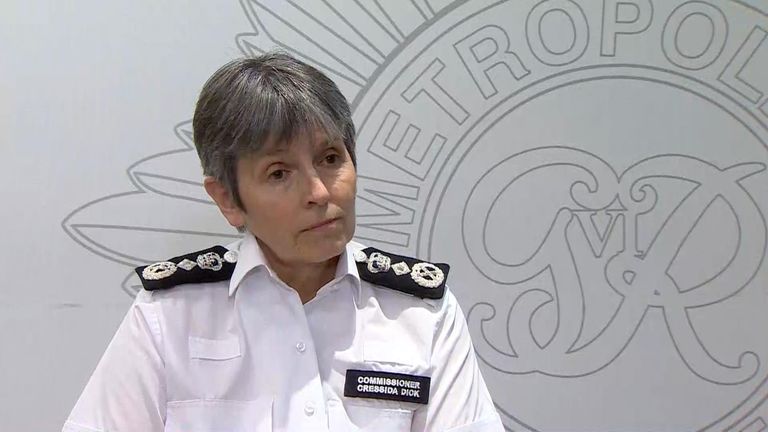Sarah Everard: Plain clothes police officers could patrol pubs and clubs to protect women
Plain clothes police officers could patrol bars and nightclubs around the country as part of plans to protect women from “predatory” offenders.
The plan is part of a move by ministers to take “immediate steps to provide further reassurance” for women and girls in the wake of the killing of Sarah Everard, as demonstrators descended on Westminster.
Senior government figures, including Home Secretary Priti Patel, gathered in Downing Street for a meeting of the Criminal Justice Taskforce.
The meeting was chaired by Boris Johnson who said the “horrific case” had “unleashed a wave of feeling about women not feeling safe at night”.
“We must do everything we can to ensure our streets are safe, and we are bringing in landmark legislation to toughen sentences and put more police on the streets,” Mr Johnson continued.
“We are also now taking further steps to provide greater reassurance, such as providing better lighting and greater use of CCTV in parks and routes women may take on their walks home.
“Ultimately, we must drive out violence against women and girls and make every part of the criminal justice system work to better protect and defend them.”
The government has said it will double its Safer Streets fund to £45m, which provides for things like better lighting and CCTV.
Ministers will work with police forces and police and crime commissioners to make sure these are targeted at areas of potential concern for women.
There will also be nationwide pilots of Project Vigilance, a strategy developed by Thames Valley Police that involves uniformed and plain clothes officers undertaking undercover patrols around clubs and bars and increased patrols at closing time.
Meanwhile, a crowd turned out for a vigil in memory of Ms Everard.
Subscribe to the Daily podcast on Apple Podcasts, Google Podcasts, Spotify, Spreaker
They also voiced their opposition to legislation they fear could curtail the right to protest, as well as the police’s handling of another vigil for Ms Everard on Saturday.
They initially gathered in Parliament Square, before moving on to Westminster Bridge and Scotland Yard.
Police made a number of arrests after demonstrators were given an ultimatum to disperse.
Ms Everard disappeared while walking home in south London on 3 March, with her remains being found in Kent a week later.
Her killing has sparked a reckoning over violence and harassment experienced by women, as well as provoking calls for meaningful change.
Policing tactics at a vigil in memory of the 33-year-old on Saturday, with officers grabbing several women and leading them away in handcuffs, have been criticised.
Reclaim These Streets had planned to hold a vigil on Clapham Common, but cancelled it after police said it risked breaching COVID-19 rules.
Despite this, hundreds of people gathered in the area.
The prime minister has given his backing to Met Police Commissioner Dame Cressida Dick, who was at Monday’s meeting of the taskforce.
And Foreign Secretary Dominic Raab told Sky News there was a “thorny issue” in how to “get the balance right between peaceful protest – expressing our concern with something as terrible as the Sarah Everard case – whilst also the public protection as we come through this vicious and deadly pandemic”.
“The concern would be if we made exceptions for one or other, however compelling the case was, is that we would start to see more widespread disobedience or non-compliance with the rules,” he added.
“And then what would that mean for public health? That’s the very fine line we’ve got to navigate.”
Amid this backdrop, MPs began debating the Police, Crime, Sentencing and Courts Bill.
Ministers say the legislation contains a raft of measures to support victims of violent crimes, including young women and girls.
This includes new measures to toughen sentences for rapists, to stop the early release of serious sexual and violent offenders, and to toughen the law on domestic violence.
But critics fear the wide-ranging provisions contained in the bill could seriously curtail people’s right to protest.
The legislation includes plans to give police more powers to tackle non-violent protests which result in serious disruption to the public or hinder access to parliament.
An offence of “intentionally or recklessly causing public nuisance” is included in the bill.
Someone commits this offence if they cause “serious harm to the public”, which can include “serious annoyance, serious inconvenience or serious loss of amenity”. If convicted, individuals could be hit with a fine or face a prison sentence.
Officers could also be given more powers to impose conditions on static protests, such as time and noise limits, as well as extending those rules to one-person demonstrations.
Labour has said it will vote against the bill at its second reading on Tuesday, arguing it includes “poorly thought-out measures to impose disproportionate controls on free expression”.
Some backbench Conservative MPs also voiced their unease with the provisions in the bill.
Former prime minister Theresa May said she feared the “potential unintended consequences of some of measures in the bill, which have been drawn quite widely”.
“I would urge the government to consider carefully the need to walk a fine line between being popular and populist. Our freedoms depend on it,” she said.
Sir Graham Brady, chairman of the 1922 Committee of backbench Tories, urged Ms Patel to “make sure that the legislation that we’re about to pass protects that right of peaceful protest and only stops serious disruption”.
Responding to these concerns, the home secretary said the right to protest peacefully was a “cornerstone of democracy” and something the government “will always defend”.
“But there is a balance to be struck between the rights of the protester and the rights of individuals to go about their daily lives,” she said.
Meanwhile, peers in the House of Lords have inflicted a number of defeats on the government’s Domestic Abuse Bill, including a move to flag, track and target repeat offenders and stalkers.
Source: Read Full Article

